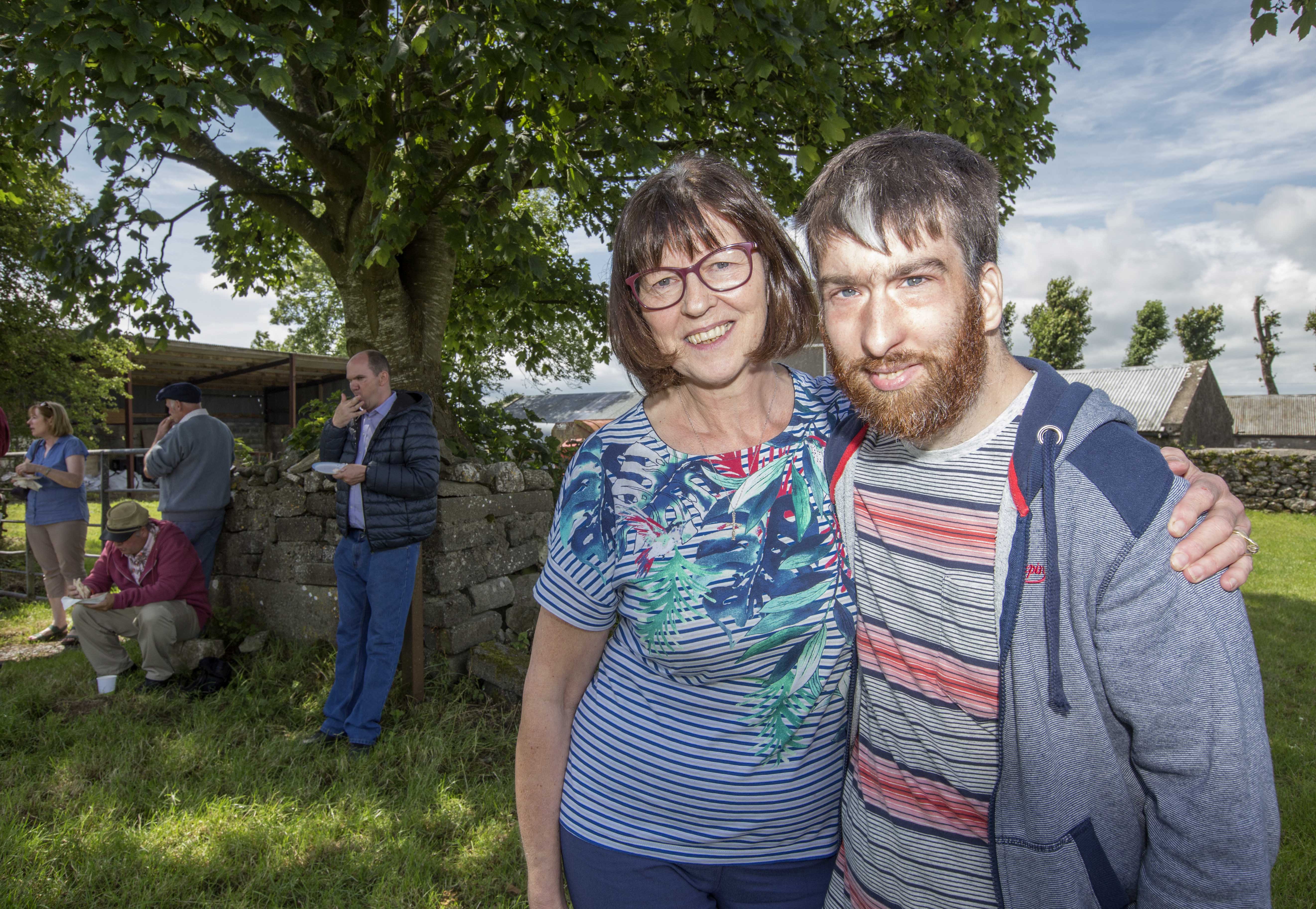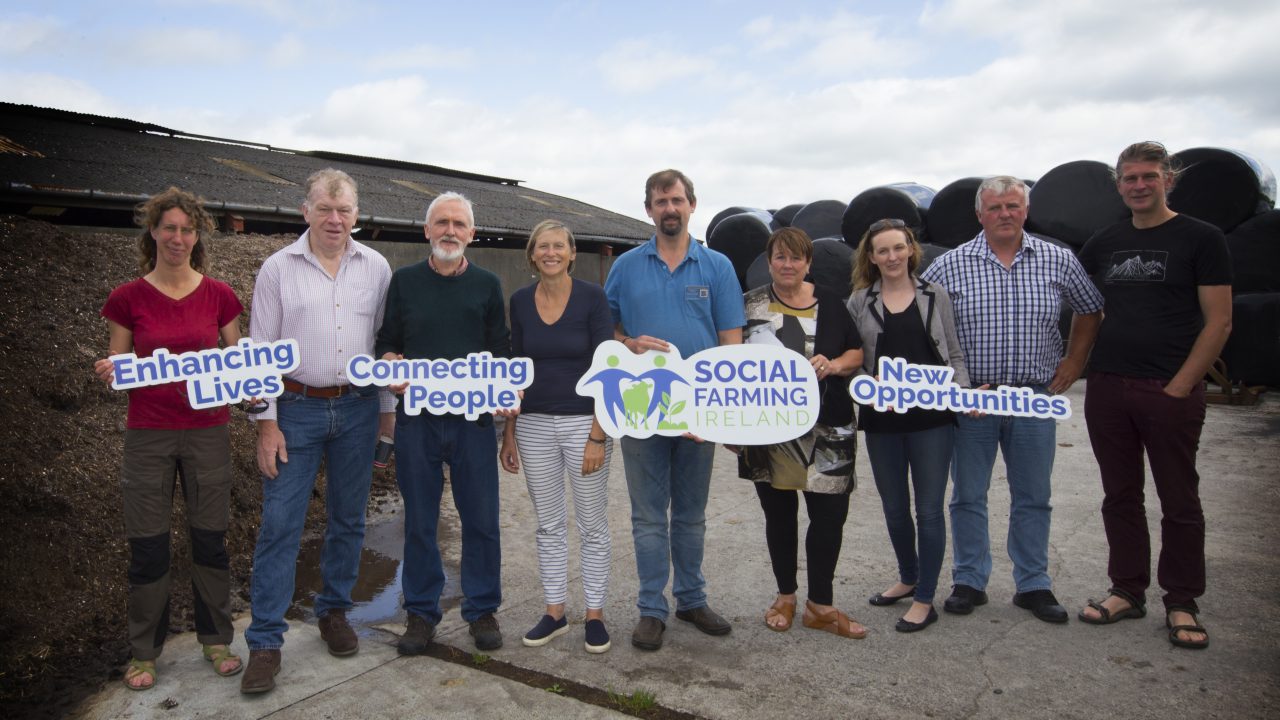The ordinary Irish working farm is proving to be a place where people with intellectual disabilities are supported to grow and develop new interests and experiences; to be themselves; to contribute in a very real way to the life of the farm; to build friendships and natural community connections; and to have a lot of fun.
That was the message from the presentation of a new piece of Irish-based research published by Social Farming Ireland, launched by minister Finian McGrath on the farm of Anna and Oliver Dixon near Claremorris, Co. Mayo, on July 23.
Over 200 people from around the country gathered in the sunshine to hear from social farming participants; staff and management from intellectual disability services; parents; and Social Farming Ireland about the real value of social farming in enhancing the lives of people with intellectual disabilities.
Sharing their farm
Host farmers on the day, Anna and Oliver Dixon, told the large crowd their sense of personal satisfaction and enjoyment from opening up and sharing their farm with others. They urged other farmers to explore this as an option.

Mary Caulfield from Co. Roscommon with her son, Seamus, who participates in social farming, supported by the Brothers of Charity, Roscommon. Image source: Brian Farrell
For Mary Caulfield, whose son Seamus has participated in social farming over a number of years, spending time on a farm gives him a great sense of fulfillment and happiness. She spoke of how he has gained practical farming and household skills, but has also developed a strong sense of his own value and what he has to contribute.
She drew particular attention to the therapeutic effects of caring for and being around the animals on the farm and to the value of the small group in enabling Seamus to express himself to discover and develop what interests him.
“Social farming is really helping Seamus to be the best person he can be,” she said.
Social farming participant Mary Henry and social farmer Fania Ellison from just outside Newport, Co. Mayo, spoke together of the many things they do side-by-side on Fania’s smallholding including sweeping leaves, sowing vegetables, playing with the dogs and feeding the chickens.
Mary also gets to bring home some of the things which she has actively cultivated and grown. Services for people with intellectual disabilities were equally enthusiastic about the benefits and value of social farming placements on ‘ordinary’ farms.
CEO of Western Care, Bernard O’Regan, who is also chairperson of the National Federation of Voluntary Bodies, spoke of the tremendous interest in social farming among the people they work with in Western Care.
It has exceeded all the goals we would have envisaged for it in terms of social inclusion and providing real choice.
He highlighted the need for support from Government to be ongoing for such a valuable initiative. This was echoed by Sean Conneally, sector manager of Brothers of Charity, Galway, whose rationale for ongoing support for social farming is simple: “This works for people.”

On the farm of Oliver and Anna Dixon, Claremorris, Co. Mayo, was minister of state for disability issues, Finian McGrath. Image source: Brian Farrell
Activity doubled
Annamarie McNally, from the Department of Agriculture, Food and the Marine, emphasised her department’s ongoing commitment to and support for social farming and the growth in activity which this has enabled in the last number of years, with activity doubling between 2017 and 2018.
Social Farming Ireland policy officer, Dr. Aisling Moroney, focused on how social farming both reflects and helps drive forward policy and change in the intellectual disability sector.
The shift in policy and increasingly in practice is away from a more medical and segregated model of care to a more social model where people are instead supported and empowered to do what they want to do.
“We know that most people just want to contribute; to do ordinary things in ordinary places; to be independent; to make friends; to have fun; to have autonomy; and to take risks.
“Social farming provides an opportunity for people with an interest in farming or being out in nature to experience all of that in their own local communities and without having to build anything new or reinvent the wheel,” Aisling said.
“Social farming simply uses the assets of people, place, environment and community that are already embedded in Irish farming life, in new ways to benefit both participants and farm families,” she said.
Ability rather than disability
Launching the report, minister of state for disability issues, Finian McGrath, underlined his support for social farming as an initiative that celebrates ability rather than disability, where people can develop their potential and improve their physical and mental health on ‘ordinary’ farms.
Social farming, he said, contributes to Ireland meeting its obligations under the United Nations Convention on the Rights of Persons with Disabilities which he helped ratify in 2018.
Minister McGrath commended all the stakeholders who have worked to advance social farming opportunities for people with disabilities in Ireland including participants, farmers, services and Social Farming Ireland.
He emphasised the need for people to continue to work together and with him as minister to improve the lives of people with disabilities.
A national social farming office, funded by the Department of Agriculture, Food and the Marine through the CEDRA Fund, is based in Leitrim Development Company.
It supports the national development of social farming in collaboration with three partner organisations – West Limerick Resources, Waterford Leader Partnership and South West Mayo Development Company – where regional development officers are based.
More information is available from national project coordinator, Helen Doherty, at the national social farming office on: 071-9641772; or email at: [email protected].


